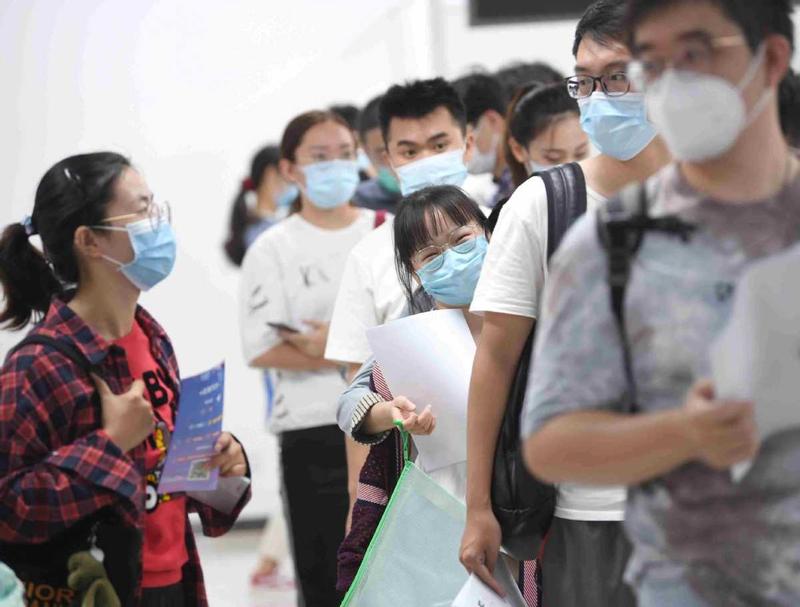 This undated photo shows people waiting in line at a job fair in Beijing, capital of China. (HAO YI / FOR CHINA DAILY)
This undated photo shows people waiting in line at a job fair in Beijing, capital of China. (HAO YI / FOR CHINA DAILY)
China's new college graduates have enjoyed stable employment this year thanks to joint efforts by central and local governments, universities and enterprises, a senior education official said on Monday.
The country had a record 8.74 million graduates this year, 400,000 more than last year, according to the Ministry of Education.
They have been faced with "unprecedented challenges" due to the COVID-19 pandemic and other factors, and it has been "extremely difficult" to ensure stable employment, said Wang Hui, director of the ministry's department of college student affairs.
To ease the employment pressure on new graduates, the ministry plans to increase the enrollment of master's degree students by 189,000, while the country's bachelor's degree programs strive to admit an additional 322,000 junior college students
More than 2.8 million students have found jobs in the public sector, including in government institutions, State-owned enterprises, public schools, grassroots service and rural areas, up from 2.1 million last year, he said at a news conference.
To ease the employment pressure on new graduates, the ministry plans to increase the enrollment of master's degree students by 189,000, while the country's bachelor's degree programs strive to admit an additional 322,000 junior college students.
More than 400,000 fresh college graduates are expected to work as teachers at kindergartens and primary and secondary schools this year, according to a notice issued by six departments in May.
ALSO READ: Increasing demand best way to boost employment
The ministry launched a 24-hour online campus recruitment service in late February to help graduates find jobs amid the epidemic, Wang said.
The free service is available on the ministry's campus recruitment portal and nine leading job-hunting websites in China, all of which have designated special webpages for the project, he said.
Around 15.2 million job postings have been published on the portal, with 6.69 million graduates registering at the site and submitting resumes 37.3 million times, he added.
Huang Xiongbiao, deputy director of the education department of the Guangxi Zhuang autonomous region, said 222,800 university graduates had found jobs by Sept 1, accounting for 81.3 percent of university graduates in the region.
Guangxi has offered subsidies for small and micro-sized enterprises that have hired new graduates as well as those who have finished their studies within the last two years, he said.
The number of students pursuing higher degrees has increased to 43,000 this year, and the number of students joining the military is up 20 percent from last year, he added.
Yu Hanyu, student counselor at Hunan University in Changsha, said many of her students have suffered anxiety while looking for jobs due to the epidemic.
READ MORE: Employment, better life given priority
By Feb, 31 of them had not found work. She set up records on the employment demands of all her students, she said.
"I talk with them every day through video chats or phone calls to encourage them not to give up and attend more online job fairs," she said.
She also opened an account at video-sharing website Bilibili, which offers guidance for students looking for jobs, Yu said, adding that the website's five livestreaming career guidance courses have been viewed more than 20,000 times.
All but one of her students has found jobs, and that one is waiting to hear about a position with the local government, she said.


